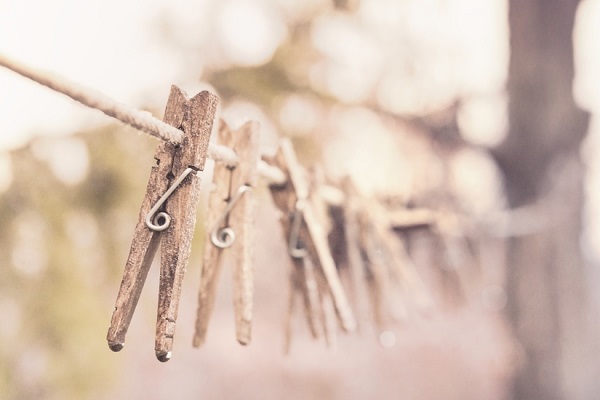I arrive home from the woods to find my bedroom a wilderness of disaster.
The laundry from weeks ago is folded, unfolded, folding into wrinkles that I’ll need to iron. Wait, do I even have an iron? I can’t recall. Outfits tried on once and wadded away now lay miserably in corners, catching dog fluff. Unworn, shirts with the tag still on are tangled up with delivery wrappings, a dry-cleaner’s hanger and a pair of socks (one clean, one dirty).
It’s my making and I’ve never minded the mess before. Indeed, I thought of it as a badge of honor of a creative person whose mind had more interesting places to wander off to.
But then I went into the woods.
For a summer, I made my own Walden in a nook of Appalachia.
There I lived deliberately, fronting a variety of essential facts and learning things. And now, when my time comes to an end, I need not worry that I have never lived.
I’m home now—at the address on my driver’s license. But this bedroom feels heavy and depressing, rather than cozy and familiar.
“Things do not change. We change.”
Frankly, I don’t even want to be here.
I close my eyes, breathe and fly at once to the river of the summer just ended. I find it easily: the hush of low rapids is still fresh in my mind, as is the caress of that particular breeze, bearing up its odd mineral perfume of water rolling over the stones.
I could go right this moment: not to that exotic place for it is far from my reach now, but I could simply walk outside, to my porch, to the tree shade of my own yard, to the patch of woods beyond.
But I have no time for such adventures anymore; my summer is done, and I need to do the laundry.
There is no one to blame but myself. I bought these things, I built this chaos and, in my haste to get into the wild, I left my civilised corner in disarray. And now I must deal with it.
But this will take all day and the sun is shining!
I yearn for the days when all I carried were necessities and they were few enough to fit in one backpack.
What clothing did I have then? A few pairs of pants made for climbing, comfortable shirts, sensible underwear (never overlook the importance of underwear!) and a sweater which eased a cool morning fog and made a pillow on lazy afternoons. Sometimes, I wore a simple dress for the sake of fanc, and because it made wading so much easier. My one luxury was a pair of waterproof hiking shoes, for those days when the river wandered up into the woods.
How few things I needed this summer, this most shining summer of my life.
In this laundry pile, I find 14 silky office shirts. I abandoned my 9-to-5 office job almost four years ago, but three of these shirts were purchased just days before I went to the woods. Why?
I remember the why. I remember each purchase, each turn in the fitting room, each swipe of the credit card. I remember being bored, angry, excited, lost in a moment of not feeling beautiful, lost in a moment of feeling beautiful, lost in the company of friends, lost in the pressure to impress…lost.
I wish I could go get lost in the woods again, maybe once and for all, but I have too many things here to carry.
I remember now, my friend Thoreau, whose words have whispered to me through the years, whose influence drew me off to the woods and held me there.
He warned me of the trappings of owning too many fine things, didn’t he?
“Most of the luxuries and many of the so-called comforts of life are not only not indispensable, but positive hindrances to the elevation of mankind.”
He wrote passionately against the prisons men build for themselves in material culture.
Time and again, he urged to simplify, simplify. Why didn’t I listen? Did I not understand what he meant?
I, who claimed to love and know Thoreau so well, cannot walk into my walk-in closet. It is too full of pointless possessions and it feels oppressive to even approach it.
From my dresser-top, I pluck an inside-out t-shirt bearing Thoreau’s face with the word simplify.
“Simplicity, simplicity, simplicity! I say, let your affairs be as two or three, and not a hundred or a thousand; instead of a million count half a dozen, and keep your accounts on your thumb nail.”
I have had enough! No—I have had too much.
I am not going to put my laundry away. I am going to put it out!
I wrestle all the drawers open. They stick as I tug them because they’re so crammed with my collection of coverings. I dump them onto the mountain of laundry and head to the closet, seizing all the things, sliding off hangers or taking hangers along for the ride: I don’t care.
It is worse than before, but only momentarily.
Into this jungle I crawl, dividing into piles and weeding out the obvious: things which are torn and I will never have time to fix, things I haven’t worn in ages, things which haven’t fit me since I stopped being a starving student, things which belong to a life no longer mine.
I do not throw out everything.
I sort clothing into categories and seasons, and allow myself a limited number of items from each pile.
Five pieces per category feels reasonable to me. I have read of people who keep only five things and make a whole wardrobe of it, but I am not quite there yet (and I don’t know if I ever will be). On this first crashing leap toward simplicity, I allow my healing self some grace. Five long-sleeved tops feels deliciously liberating, when reduced from 19, yet choosing just five things is more difficult than I would like to admit.
This is a careful decision-making process and there’s a skill set for it. It’s here, under all this clutter, but I have to reach back to my roots to find it.
I remember how the ladies in my family shopped for clothing when I was a little kid, when we were all so desperately poor that something as simple as socks was a welcome gift.
Shopping poor was a careful business. One had to consider how well each item could be paired with others already owned, used throughout seasons or layered. One must mind the sort of care the garment would require and whether one had tools and time for it. One must inspect the seams, button-holds, zipper performance and overall quality of the piece as well.
I realize now that poverty had compelled a mindfulness about clothing which I, in the process of getting un-poor, had lost.
It had felt good to grow up, to burst free of that limitation and know I could afford to treat myself. It felt good to experience little splurges I’d never had before. But as the years rolled by it got out of hand.
“As you simplify your life, the laws of the universe will be simpler; solitude will not be solitude, poverty will not be poverty, nor weakness weakness.”
I stuff my beautiful garments into trash bags and am forced to confront how many things I have bought without any thought at all.
I’m appalled. I wonder where else I might have applied the resources wasted on this collection.
I line up the bags in the hall, waiting for a donation center to claim them. So many things I never needed! I hope they will find someone who will make use of them; someone with an eye for what it is necessary, what is useful, what is worth one’s time and investment.
Upstairs, my closet is airy now and it is more than a walk-in: it could be a twirl-in! Drawers open and close as they should. The mountains of unkempt laundry are gone, and all my storage space has a wonderful bit of emptiness about it.
Deliciously absent is any compulsion to fill those spaces.
Though the afternoon is almost spent, I slip on my Simplify t-shirt, pick up my little journal and head outside to discover the best tree in the yard and sit in its shade.
I am home from the woods and this is a treat I think I’ve earned.
“We can never have enough of nature.”
(All quotes by Henry David Thoreau.)
~
Author: Katie-Anne Lauluments
Editor: Katarina Tavčar
Photo: Pexels











Read 6 comments and reply